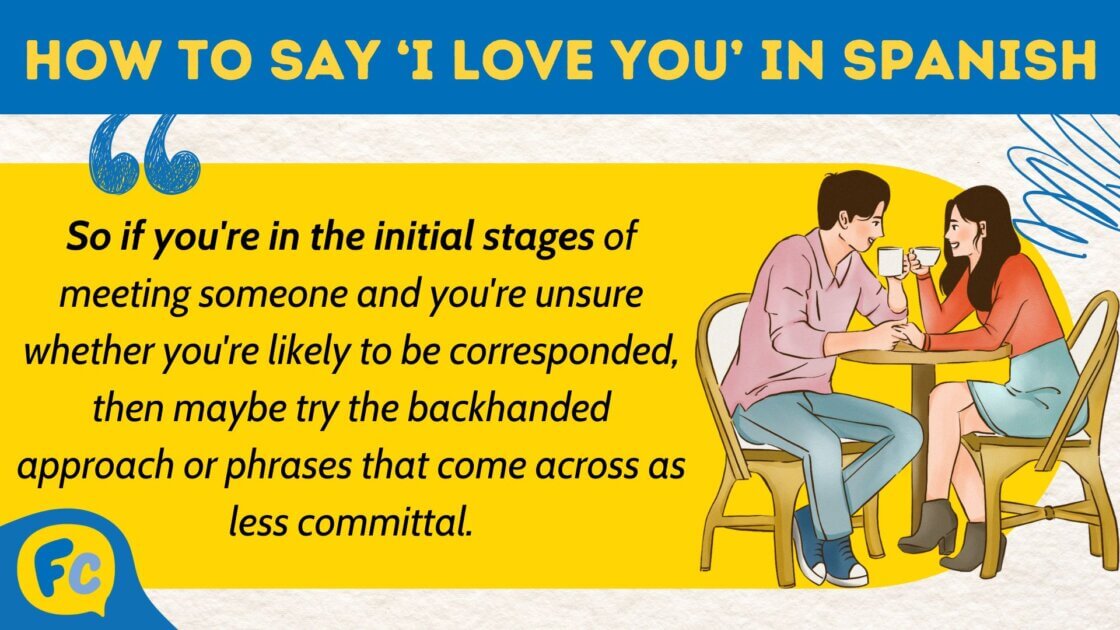The Love Spectrum Vocabulary 💗 How To Say ‘I Love You’ in Spanish
How To Say ‘I Love You’ in Spanish:
The Love Word for Each Step up the Commitment Ladder

In today’s blog, love is in the air…
In English, ‘I love you’ is almost a sweeping statement, no gradations can be initially determined, at least point blank.
📌 You would agree that for more clarity on the degree of love being expressed (in English), one would have to resort to context and cues.
Does the same occur in Spanish?
Absolutely not!
Spain is a Latin culture, passion runs through their veins and the phrase ‘I love you’ would be no exception, being charged with different levels of intensity and increment.
👉 Let’s unveil the love spectrum vocabulary in Spanish to make sure those feelings and levels of emotion are matched with the corresponding Spanish words.
✨ Dive into the art of expressing ‘I Love You’ in Spanish!✨
How To Say ‘I Love You’ in Spanish || Love in Spanish, the Passionate Kind
How To Say ‘I Love You’ in Spanish || Love in Spanish, When It’s the Real Deal
How To Say ‘I Love You’ in Spanish || Love in Spanish, the Initial Stages
How To Say ‘I Love You’ in Spanish || Terms of Endearment in Spanish
How To Say ‘I Love You’ in Spanish || Quiz
How To Say ‘I Love You’ in Spanish || FAQs
How To Say ‘I Love You’ in Spanish ||
Love in Spanish – the Passionate Kind

👉 While in Spanish there are two verbs that are synonymous with the English verb ‘to love’ and both are often used interchangeably in many situations, each is quite nuanced and has specific contexts of use.
One of the ways one can say I love you in Spanish is te quiero .
The verb querer , translates to the English verb ‘to love’ but with a different gradation. Querer, literally means ‘to want’.
Semantically speaking, querer would be more in tune with a possessive emotion, what one wants and desires.
📌 So in line with this meaning, te quiero refers – more often than not – to a feeling of affection and desire for someone or something.
When saying ‘I love you’ in Spanish by opting for the phrase te quiero, one might imply wanting to satiate an emotional need (the object of our desire) and a certain degree of necessity and dependency.
💬 Bottom line and while this is not an absolute, te quiero seems more ardent and passionate, most suitable in the kind of relations that stem from physical attraction and more transient emotional needs or in the earlier stages of a romantic relationship.
A love disclaimer, the friend zone:
👉 So what about when in the friend zone, how to say ‘I love you’ in Spanish in a non-romantic way?
When in the friend zone (and friends and family in general), ‘I love you’ in Spanish is generally expressed using te quiero , as it allows for a more versatile use of the phrase, expressing love and affection in a familial or friendly way.

How To Say ‘I Love You’ in Spanish ||
Love in Spanish – When It’s the Real Deal
👉 Another way to say I love you in Spanish is te amo, which stems from the verb amar and that translates to the English verb ‘to love’. The Spanish dictionary defines the verb amar as ‘having love for someone or something’.

Te amo is a step up the commitment ladder in comparison to the more superficial love professed when one says te quiero .
Amar refers to a deeper feeling of love, more visceral and committed than the less lofty querer . There is a message of a more profound connection with the other person that comes with te amo.
To love in the sense of amar in Spanish, signifies an evolved version of love (that perhaps initially stemmed from querer), giving way to more mature feelings, such as respect, trust, loyalty, acceptance and giving oneself in full to the other person.
How To Say ‘I Love You’ in Spanish ||
Love in Spanish – the Initial Stages

Go ahead and compliment someone or if you’re brave enough, just outright express some low-key feelings (life favors the bold, remember!).
👉 Here are some phrases that just might come in handy:
Eres muy simpatico/a. (You’re very nice, with an element of charm.)
This is a simple compliment that always sits well, whether or not the person is your love interest. It also lets the other person know that you find them charming.
Another compliment revolving around a person’s charm would be Eres un encanto (literally means ‘You are delightful’ and similar to saying ‘You are a darling’).
Me caes bien. (I like you or we get along well). This is a pretty safe one to utter as it can just as well be said to a friend.

Me gustas. (I like you and denotes a certain degree of fondness.)
Me encantas. (equivalent to saying, I really like you.)
And if you want to keep things casual, here are some more informal ways of saying ‘I like you’ in Spanish:
Me flipas (equivalent to saying I like you, with a head-over-heels component)
Me molas (equivalent to saying I dig you, with a ‘you’re cool’ component)

Tips on How To Flirt in Spanish and Up Your Game 😘
How To Flirt in SpanishSpain’s Unique Romance Style Flirting in a new language can be both exciting and a bit nerve-wracking, especially when you want to make a great impression. Spanish, with its melodic flow and passionate expression, is a…
How To Say ‘I Love You’ in Spanish ||
Terms of Endearment in Spanish
Looking for a nickname for your Spanish special person?
👉 Irrespective of your level of commitment and intimacy (that’s for you to gauge!), here are some of the most commonly used terms of endearment in Spain:
The classic
amor or mi amor (love or my love)
Variations to mi amor
| Spanish | English |
|---|---|
| Cariño | Sweetheart, darling |
| Cariño mío | My darling |
| Querido/a | Dear |
| Cielo | Sky (like calling someone your sky) |
| Mi vida / Vida mía | My life |
| Corazón / Mi corazón | Heart / My heart |
| Tesoro | Treasure (akin to calling someone precious) |

Darlings and the like
| Spanish | English |
|---|---|
| Cariño | Sweetheart, darling |
| Cariño mío | My darling |
| Querido/a | Dear |
| Cielo | Sky (like calling someone your sky) |
How To Say ‘I Love You’ in Spanish || Quiz
Now you’ve mastered How to Say ‘I Love You’, let’s check out these Spanish essentials?
BONUS | Learn how to say ‘I love you’ in Chinese, Japanese, Korean and Vietnamese!
How To Say ‘I Love You’ in Spanish || FAQs
What is the difference between Te quiero and Te amo in Spanish?
Te quiero and Te amo synonymously translate to ‘I love you’ in English. While both are often used interchangeably in many situations, each has a different level of emotional intensity and has specific contexts of use.
Te quiero, literally means ‘I want you’, so its use is more in line with – more often than not – a feeling of affection and desire for someone or something.
Te amo, on the other hand, expresses a loftier and more profound feeling of love.
To love in the sense of amar in Spanish, signifies an evolved version of love, giving way more mature feelings, such as respect, trust, loyalty, acceptance, giving oneself in full to the other person, etc.
Is it amor or amar in Spanish?
When used as a verb (‘to love’), the correct term to use in Spanish is amar and as a verb, it is subject to conjugation, like in the example below:
Ella te ama (She loves you).
When used as a noun, the correct term to use in Spanish is amor, like in the example below:
El amor entre hermanos es un vínculo especial. (The love between siblings is a special bond.)
Is saying Te quiero a big deal?
While saying Te quiero (I love you) or Te quiero mucho (I love you very much) in Spanish can have romantic connotations, it is just as often used to express affection and love between friends and family.
Te quiero, literally means ‘I want you’, so in the romantic sense, its use is more in line with a feeling of affection and desire for someone or something.
To express more depth and profound feelings of love, your go-to would be Te amo, now that’s a bigger deal, even if it would still just as well translate to the English ‘I love you’.
How do you say ‘Love to do something’ in Spanish?
If you want to express your love for doing something in Spanish, like your love for eating chocolate cupcakes or for going to the beach, the correct term is encanta, from the verb encantar (literally ‘to delight’ and in this context, ‘to like’ or ‘to love’).
Some examples would be:
Me encanta comer magdalenas de chocolate. (I love to eat chocolate cupcakes.)
Nos encanta ir a la playa. (We love to go to the beach.)
How to say I love you to a friend in Spanish?
When in the friend zone and even with friends and family in general, I love you in Spanish in a non-romantic way is generally expressed by using te quiero.
Te quiero allows for a more versatile use of the phrase ‘I love you’, as it can also have romantic connotations, although of a less profound level and depth than the Spanish phrase Te amo (which also translates to the English I love you).
Want More From LTL?
FANCY LEARNING SPANISH? Check out our online Spanish courses here.
We offer a 7-day free trial to all online students where you can study Spanish 24/7. It doesn’t end there either.
We teach over 10 of the world’s most popular languages 😎
Come and be a part of our amazing community.











